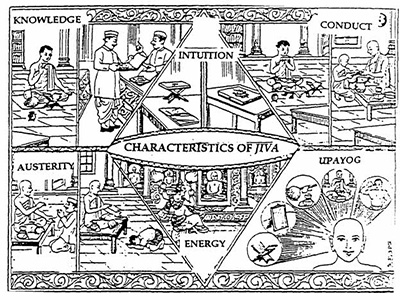
Good conduct is defined as the rejection of sinful activities. It is twofold: partial (desavirati) and total (sarvavirati).39 The five lesser vows (anuvrata), the three meritorious vows (gunavrata), the four disciplinary vows (siksavrata) are considered the twelve fold partial reduction. Among these, avoidance of injury, lying, stealing, impurity, and possessions in their grosser forms are called by the Jinas the ‘lesser vows.’ The three ‘meritorious vows’ are: the limitation of travel, the limitation of things of single and repeated use, and the limitation of purposeless injury. The four ‘disciplinary vows’ are tranquility, limitation to one place, fasting, and living like a muni, the distribution of alms. Continue reading “Sermon – Part 2” »
Sermon – Part 2
Thirteenth Incarnation – The birth of Rsabha
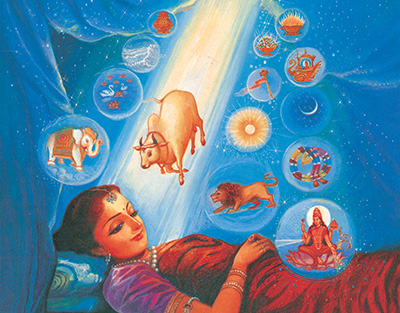
When there remained in the third spoke of time eighty-four lacs of Purvas plus eighty-nine fortnights, on the fourth day of the dark fortnight of the month Asadha, when the moon was in conjunction with the Uttarasadha constellation, the soul of Sri Vajranabha, after completing a span of life to the extent of thirty-three sagaropamas, fell from Sarvarthasiddhi and descended into the womb of Marudevi, the wife of Sri Nabhi, as a hansa would descend from Lake Manasa to the bank of the Mandakinis. Continue reading “Thirteenth Incarnation – The birth of Rsabha” »
Stuti
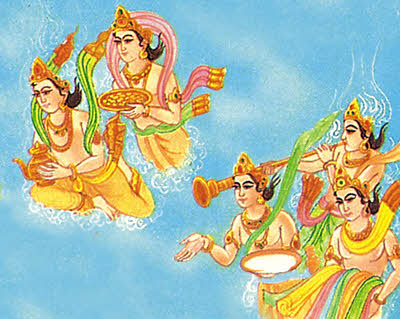
“Reverence to you, O Lord of the Congregation, Protector of the World, Ocean of Compassion, O Lord, son of Sri Nabhi. O Lord, you are resplendent with the three knowledge’s, sense knowledge, etc., innate, like Mt. Meru with the parks, Nandana, etc. O God, this zone of Bharata today surpasses heaven, since it is adorned by you, the crest-jewel of the three worlds. Like you, this day is to be held in respect throughout samsara, purified by the festival of your birth kalyana, O Lord of the World. From the auspicious occasion of your birth, happiness arose even for the inhabitants of hell. Continue reading “Stuti” »
Personal Description of the Lord
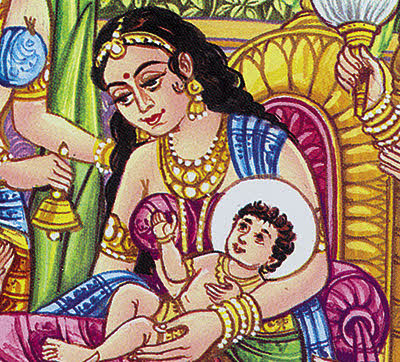
In youth the feet of the Lord were soft, red, like the inside of a lotus, warm, firm, free from perspiration, with smooth soles. As if for removing distress of those bowed (at his feet), the Lord’s cakra appeared, and the wreath, goad, and banner, like those of the elephant of Sri always present. The conch and the pitcher shone on the soles, and the svastika on the heels of the Master’s feet like pleasure-houses of Laksmi. Fleshy, round, high, like a serpent’s hood, the great toe of the Master was marked with a srivatsas, like a calf. Continue reading “Personal Description of the Lord” »
Birth Ceremonies
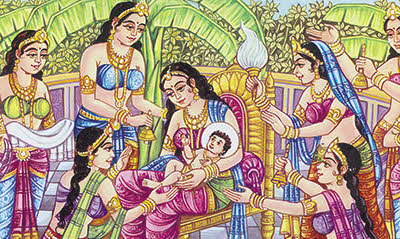
Then eight Dikkumaris living in the lower world, their thrones being shaken at once, came to the birth-house. Bhogankara, Bhogavati, Subhoga, Bhogamalini, Toyadhara, Vicitra, Puspamala, Abhinandita. After they had circumabulated three times the first Tirthankaras and his mother, and had paid homage to them, they said, “Reverence to you, Mother of the World, Giver of the Light of the World. We eight Dikkumaris, living in the lower world, have come here by his power to make a festival to him, knowing by clairvoyant knowledge the purifying birth of the Tirthankara. Continue reading “Birth Ceremonies” »
Childhood of Lord Rishabhdev

Then the Lady Marudeva awakened and related to Nabhi this meeting with the gods like a dream at night.
Since a bull was the mark on the thigh of the Lord of the World, and since a bull was seen first by his mother in her dream, the delighted parents named him ‘Rsabha’, with a festival on an auspicious day. Then the parents gave a suitable purifying name also, Sumangala, to the daughter born as his twin. Continue reading “Childhood of Lord Rishabhdev” »
A Spring Festival
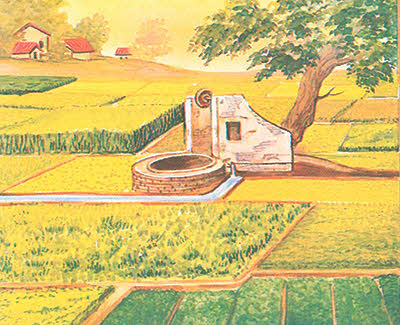
One day, when Spring, the abode of love, had come, the Lord went to a garden to please his retinue. There in a bower of flowers, the Master of the World, adorned with ornaments of flowers, sat like Spring personified. The Laksmi of Spring, as it were, gave welcome to the Lord of the World by humming bees intoxicated by the juice of blossoming mango-trees. An overture, as it were, being performed by cuckoos singing the fifth note, the wind from Malaya, the leader of the dance, showed the dance of the creepers. Continue reading “A Spring Festival” »
The Gods – Their Cars – Their Bells their Family – Part 2
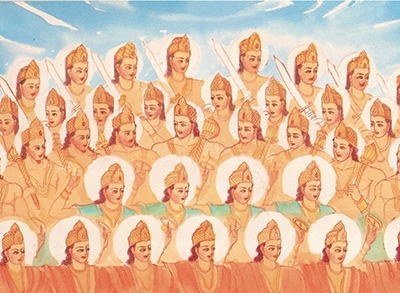
Surrounded on all sides by ten thousand Samanikas, by the fourfold body guards, by the Trayastrinsas, the three assemblies, the four Lokapalas, the seven great armies and the seven generals, the Indra of Arana and Acyuta, pure, began to bathe the Blessed One. After putting on his upper garment, possessing unselfish devotion, Acyuta took a double handful of flowers of the blooming coral-tree, etc. After perfuming it with fragrant dense smoke from incense, he threw the double handful of flowers before the Lord of the Three Worlds. Continue reading “The Gods – Their Cars – Their Bells their Family – Part 2” »
The Lord’s Marriage

One day, a pair of twins, as they were playing together in accordance with the nature of children, went together under a palm tree. By the evil contrivance of fate, just then a large palm-fruit fell from the tree on the boy’s head like a stroke of lightning on a castor bean plant. Struck on the head in the manner of the crow-and-palm tree fable, the boy died then by the first accidental death. Because he had very slight passions, the boy-twin went to heaven. Cotton indeed rises in the air from its lightness. Formerly, large birds at once lifted up the bodies of dead twins like nest wood, and threw them in the Ocean. At that time, from the deterioration (of the times), the body remained just so. For the avasarpini has decreasing power. Then the second one of the twins, the girl, by nature endowed with innocence, stood with tremulous eyes, like a remnant after a sale. Her parents took her and raised her, and gave her the name Sunanda. After a few days her parents also died. For the twins live but a short time after their children are born. The girl, dazed by wondering what to do, with restless eye, wandered alone in the forest like a deer lost from the herd. Continue reading “The Lord’s Marriage” »
Description of Vaitadhya
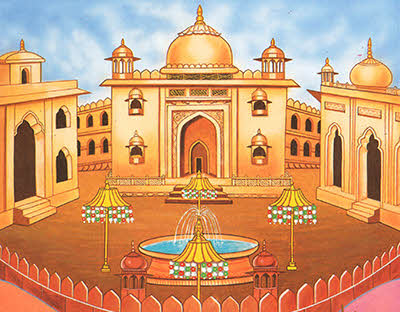
Taking their families and all their retinue and ascending the best of cars, they went to Vaitadhya. They landed on Mt. Vaitadhya which is kissed by the mass of waves of the Lavana Ocean at its borders, placed like a measuring-rod between the east and west quarters; a boundary between the northern and southern parts of Bharata, fifty yojanas wide north and south; buried six and a quarter yojanas in the earth, twenty-five yojanas high; embraced on all sides by the Gangas and Sindhu rivers as if by Mt. Hima with arms stretched out from afar; possessing caves named Khandaprapata and Tamisra that were like houses of pleasure and rest of the Sris of the two halves of Bharata; Continue reading “Description of Vaitadhya” »









